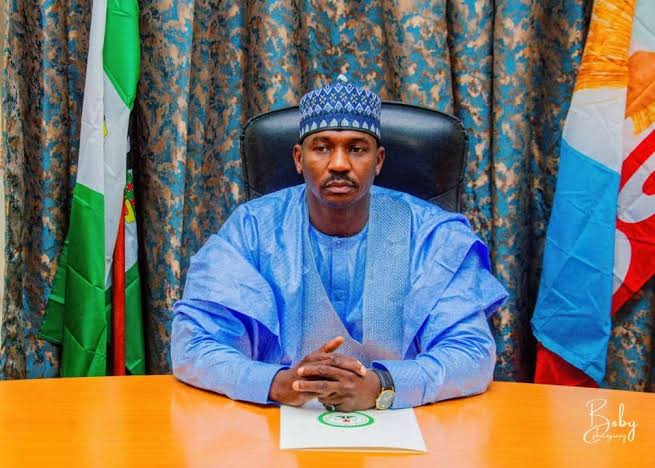The “9-Point Smart Agenda” of Governor Ahmad Aliyu of Sokoto serves as the governance policy framework. It outlines the governor’s key priorities and development plans for the state. One of the major focal areas of this agenda is health—particularly the Primary Health Care (PHC), which forms the foundational pillar of the administration’s health vision.
Today, Sokoto State is charting an inspiring course in primary healthcare, demonstrating a profound commitment to improving the health and well-being of its citizens. Through strategic investments in infrastructure, a determined effort to bolster its healthcare workforce, and the implementation of targeted programmes, the state government is not merely addressing existing health challenges but actively building a more resilient and accessible primary healthcare system that will serve all.
This transformative journey is characterized by a holistic approach, recognizing that effective primary healthcare is the bedrock of a healthy society. From the recruitment of skilled professionals to the ambitious renovation and construction of health facilities, Sokoto’s achievements reflect a dedication to ensuring that quality healthcare is within reach for every man, woman,child and that they don’t have to travel to the capital to access healthcare.
One of the most critical challenges facing healthcare systems globally is the shortage of qualified personnel. Sokoto State has taken bold and decisive steps to address this head-on, demonstrating a clear understanding that even the best facilities are ineffective without skilled hands to operate them.
A landmark achievement in this regard is the recruitment of 845 nurses and midwives. This significant injection of healthcare professionals directly addresses staffing shortages in primary healthcare centres across the state, ensuring that more communities have access to trained medical personnel for essential services.
These newly recruited professionals are frontline heroes—providing direct care, administering immunizations, and offering crucial health education.
Beyond immediate recruitment, Sokoto is also investing in the future of its healthcare workforce through an innovative scholarship programme. The state is sponsoring students to pursue medical studies abroad, with a groundbreaking commitment to automatic employment upon graduation. The trained medical professionals on graduation will serve the state for two years.
This forward-thinking initiative addresses the long-term need for specialized medical expertise within the state, creating a sustainable pipeline of highly qualified professionals who are guaranteed roles in serving their home communities. It not only tackles brain drain but also offers a powerful incentive for young Sokoto indigenes to pursue careers in medicine.
The vision for primary healthcare in Sokoto extends beyond human resources to the physical infrastructure that houses these vital services. The state government has embarked on an ambitious program of renovation and construction, fundamentally transforming the landscape of healthcare access.
Already, seven primary health centres have undergone significant renovation, improving facilities and creating more conducive environments for both patients and healthcare providers. These renovations enhance the functionality of existing centres by equipping them with better amenities and adequate space for comprehensive care.
Looking ahead, the state has even more ambitious plans, with a commitment to construct 199 additional primary health centres. This monumental undertaking will drastically improve access to quality healthcare, particularly in underserved and rural areas, bringing essential services closer to the people who need them most.
Alongside infrastructure development, the government is prioritizing the provision of essential healthcare services—especially for pregnant women. This focus underscores the critical role of maternal health in overall community well-being.
Programmes are in place to strengthen maternal and child health initiatives, aimed at reducing the high maternal and infant mortality rates. This includes tackling Vesicovaginal Fistula (VVF), a debilitating condition that disproportionately affects women in rural areas.
By providing comprehensive care—from antenatal services to safe delivery and postnatal support—Sokoto is safeguarding the lives of mothers and their newborns. The recent distribution of essential drugs and Mama Kits across all 23 Local Government Areas (LGAs), at a cost exceeding N1.5 billion, underscores the government’s commitment to ensuring safer deliveries, particularly in remote communities.
Furthermore, the state is actively expanding mass immunization programmes against childhood diseases. This proactive approach helps protect children from preventable illnesses, contributing to a healthier and more productive future generation.
The provision of health equipment to all 23 LGAs is a crucial step in ensuring that primary healthcare centres are adequately equipped to deliver a wide range of services, from routine check-ups to emergency care.
To ensure the highest standards of care, Sokoto State is implementing regular technical supervision and in-service training programs for healthcare workers at all levels. This continuous professional development ensures that staff are up to date with the latest medical practices, equipped with the necessary skills, and motivated to deliver optimal services.
A progressive move in expanding the scope of primary healthcare is the state’s ongoing effort to integrate mental health care into PHC services. This initiative recognizes the interconnectedness of physical and mental well-being and seeks to provide accessible mental health support at the community level, reducing stigma and improving overall health outcomes.
The inauguration of 16 projects at the Neuropsychiatric Hospital, Kware, further illustrates the state’s commitment to addressing mental health challenges comprehensively.
Sokoto State understands that sustainable healthcare development requires collective effort. The government is actively fostering strong relationships with donor partners, leveraging their expertise and financial support to amplify its healthcare initiatives. These collaborations are vital in augmenting resources and implementing innovative solutions to improve healthcare delivery across the state.
Equally important, is that the government is investing in working with community leaders and stakeholders to ensure the success of healthcare initiatives. This grassroots approach fosters ownership and promotes active participation from the beneficiaries themselves.
By engaging communities, health programs become more relevant, acceptable, and ultimately more effective—building a sense of shared responsibility for health outcomes.
Additionally, Governor Ahmad Aliyu of Sokoto who believes in critical partnerships to drive his health agenda—is engaging the federal government and international development partners to confront emerging challenges.
In a strategic effort to combat the escalating malnutrition crisis in Sokoto State, the federal government, in partnership with the United Nations Children’s Fund (UNICEF), has earmarked N1.5 billion in emergency funding to support targeted interventions.
Receiving a high-level delegation from UNICEF, the European Union (EU), and Médecins Sans Frontières (MSF) in Sokoto, the former Minister of Humanitarian Affairs and Poverty Alleviation, Prof. Nentawe Yilwatda, stated that the mission aimed to galvanize support to curb the alarming rise in severe acute malnutrition.
Prof. Yilwatda praised the collaboration between the state and humanitarian partners, emphasizing the need for durable, locally driven solutions. Sharing his personal experience as a former internally displaced person, he highlighted the link between malnutrition and insecurity, stressing that “there can be no food security without peace.”
UNICEF Country Representative Cristian Munduate acknowledged Sokoto State’s commitment, particularly the state government’s allocation of N500 million towards addressing the crisis. She emphasized the need for sustainable and homegrown strategies to meet the nutritional needs of Sokoto’s most vulnerable citizens.
In response, Governor Ahmad Aliyu of Sokoto expressed deep appreciation to the development partners—especially acknowledging UNICEF’s substantial pledge—and reaffirmed his administration’s political will and commitment to ending malnutrition in the state.
The comprehensive efforts of the Sokoto State Government, astutely led by Governor Ahmad Aliyu, in revolutionizing primary healthcare are painting a vivid picture of progress and promise. From bolstering the healthcare workforce and upgrading vital infrastructure to implementing life-saving programmes and forging critical partnerships, the state is laying a firm foundation for a healthier future.
These achievements are not merely policy checklists—they represent tangible improvements in the daily lives of Sokoto’s citizens. As the state continues to build on these foundations, it is well positioned to create a lasting legacy of health, dignity, and prosperity for all its people.
Gatekeepers News is not liable for opinions expressed in this article, they’re strictly the writer’s









